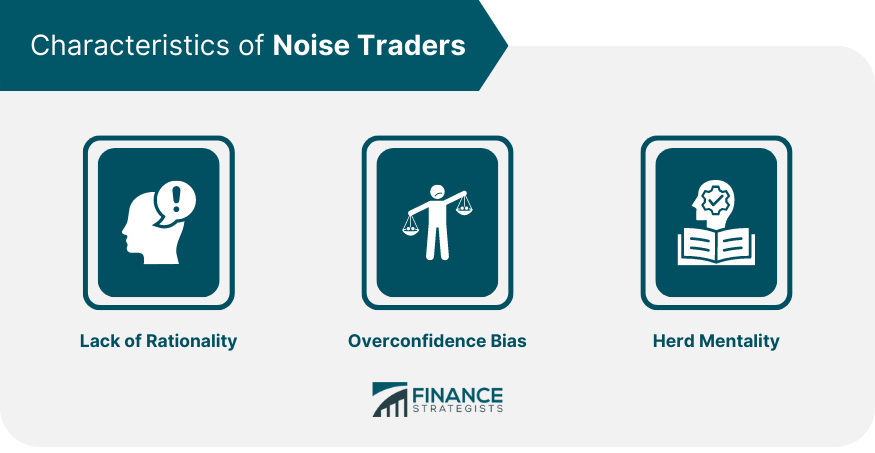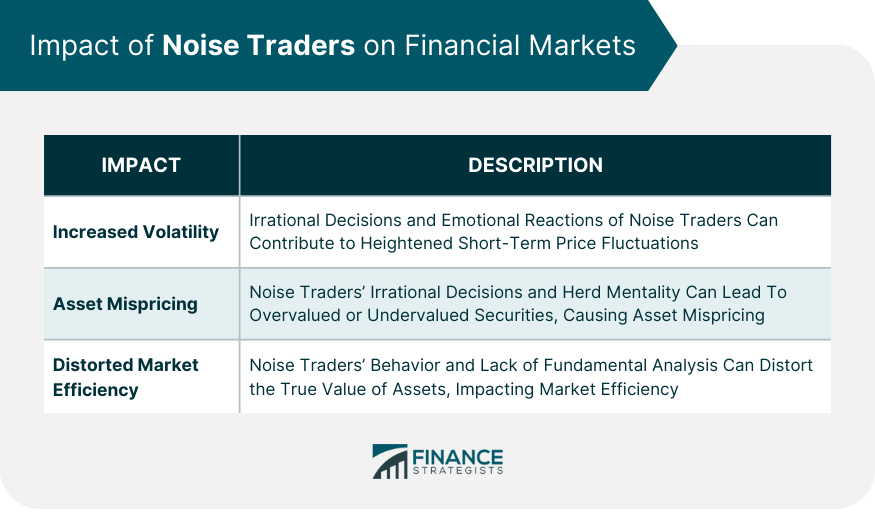A noise trader is an individual who makes investment decisions based on irrational factors or short-term market fluctuations rather than fundamental analysis and long-term trends. These investors often trade on sentiment, emotion, or superficial analysis, causing them to react to market "noise" instead of meaningful information. Understanding noise trader behavior is crucial for both individual investors and market participants, as it can significantly impact market dynamics, asset pricing, and overall market efficiency. Recognizing the influence of noise traders on financial markets can help investors develop more effective trading strategies and better navigate market fluctuations caused by irrational behavior. Noise traders often lack rationality in their investment decisions, as they tend to be swayed by emotions, market sentiment, or superficial information. This irrational behavior can lead to investment decisions that are not based on a company's fundamental value or long-term prospects, potentially resulting in suboptimal returns and increased risk. Overconfidence bias is a common characteristic of noise traders, as they may have an inflated belief in their own abilities or the accuracy of their predictions. This overconfidence can lead to excessive trading, as noise traders may believe they can accurately time the market or pick winning stocks, even when their decisions are not grounded in solid analysis. Noise traders often exhibit a herd mentality, following the crowd and making investment decisions based on the actions of other market participants rather than independent analysis. This behavior can lead to investment bubbles or crashes, as noise traders can exacerbate market trends and contribute to increased volatility and asset mispricing. Noise traders can contribute to increased volatility in financial markets, as their irrational decisions and emotional reactions can exacerbate short-term price fluctuations. This heightened volatility can create challenges for investors, making it more difficult to identify stable, long-term investment opportunities. The presence of noise traders can lead to asset mispricing, as their irrational decisions and herd mentality can cause securities to become overvalued or undervalued. This mispricing can distort the allocation of capital and resources in the market, leading to inefficiencies and potential financial losses for investors who follow noise trader behavior. Noise traders can negatively impact market efficiency, as their irrational behavior and lack of fundamental analysis can create information asymmetry and distort the true value of assets. This distortion can make it more difficult for rational investors to accurately price securities and take advantage of market inefficiencies. The behavior of noise traders, characterized by irrational decisions and a lack of fundamental analysis, can contribute to market inefficiencies. These traders often base their investment decisions on emotions and short-term market trends rather than thorough analysis of a security's underlying value. As a result, asset mispricing and distorted market dynamics can occur. These market inefficiencies pose challenges for rational investors who rely on accurate assessments of security values and seek to exploit market opportunities. The presence of noise traders can make it difficult for rational investors to determine the true worth of a security, potentially leading to missed investment opportunities or misguided trading decisions. Noise trader behavior introduces increased risk into financial markets. Their irrational decisions and emotional reactions can trigger heightened volatility and asset mispricing. The unpredictable nature of noise traders' actions can disrupt the stability and predictability of market movements. This increased risk can have negative consequences for individual portfolios as well as the overall market. Investors who are unable to effectively manage the impact of noise trader behavior may experience financial losses. The heightened volatility caused by noise traders can create an environment of uncertainty and unpredictability, making it challenging for investors to make informed decisions and mitigate risks effectively. Despite the negative consequences associated with noise trader behavior, their presence in financial markets can create opportunities for profitable trading strategies. Rational investors who possess the ability to recognize and capitalize on the irrational behavior exhibited by noise traders may be able to exploit market inefficiencies and generate higher returns. By taking advantage of the mispricing and distorted dynamics caused by noise traders, rational investors can identify undervalued or overvalued securities and execute trades to their advantage. These profitable trading strategies rely on the ability to differentiate between noise-driven market fluctuations and fundamental changes in a security's value. Successfully navigating the impact of noise trader behavior requires a combination of analytical skills, disciplined decision-making, and a comprehensive understanding of market dynamics. One effective approach to managing noise trader behavior is through investor education. By promoting financial literacy and providing resources for investors to learn about fundamental analysis, risk management, and long-term investing strategies, market participants can reduce the influence of noise traders and foster more rational decision-making in the market. Regulatory measures can also help manage noise trader behavior by implementing rules that discourage excessive trading, promote transparency, and ensure fair market practices. These measures may include restrictions on certain high-frequency trading activities or the enforcement of stricter reporting requirements for publicly traded companies, helping to reduce the impact of noise trader behavior on market dynamics. Improvements in market structure, such as enhancing liquidity, promoting transparency, and facilitating better access to information, can help reduce the influence of noise traders on financial markets. By creating a more efficient market environment, these improvements can encourage rational decision-making and reduce the impact of irrational behavior on asset pricing and market volatility. A noise trader is an individual who makes investment decisions based on irrational factors or short-term market fluctuations, often leading to suboptimal returns and increased risk. Noise traders are characterized by a lack of rationality, overconfidence bias, and herd mentality, which can contribute to market inefficiencies, increased volatility, and asset mispricing. Managing noise trader behavior can be achieved through investor education, regulatory measures, and market structure improvements. By reducing the influence of noise traders on financial markets, investors can foster a more efficient and transparent market environment, ultimately leading to better investment outcomes.What Is a Noise Trader?
Characteristics of Noise Traders
Lack of Rationality
Overconfidence Bias
Herd Mentality

Impact of Noise Traders on Financial Markets
Increased Volatility
Asset Mispricing
Distorted Market Efficiency

Consequences of Noise Trader Behavior
Market Inefficiencies
Increased Risk
Opportunities for Profitable Trading Strategies
Managing Noise Trader Behavior
Investor Education
Regulatory Measures
Market Structure Improvements
Bottom Line
Noise Trader FAQs
A noise trader refers to an investor who makes trading decisions based on irrational behavior rather than fundamental analysis or rational considerations.
Noise traders exhibit traits such as lack of rationality, overconfidence bias, and a tendency to follow herd mentality in making investment decisions.
Noise traders can increase market volatility, cause asset mispricing, and contribute to distorted market efficiency due to their irrational trading behavior.
Behavioral models such as prospect theory, herding models, and cognitive biases help explain the underlying factors driving noise trader behavior in financial markets.
Managing noise trader behavior can involve initiatives such as investor education, regulatory measures, and improvements in market structure to promote informed decision-making and reduce irrational trading.
True Tamplin is a published author, public speaker, CEO of UpDigital, and founder of Finance Strategists.
True is a Certified Educator in Personal Finance (CEPF®), author of The Handy Financial Ratios Guide, a member of the Society for Advancing Business Editing and Writing, contributes to his financial education site, Finance Strategists, and has spoken to various financial communities such as the CFA Institute, as well as university students like his Alma mater, Biola University, where he received a bachelor of science in business and data analytics.
To learn more about True, visit his personal website or view his author profiles on Amazon, Nasdaq and Forbes.











